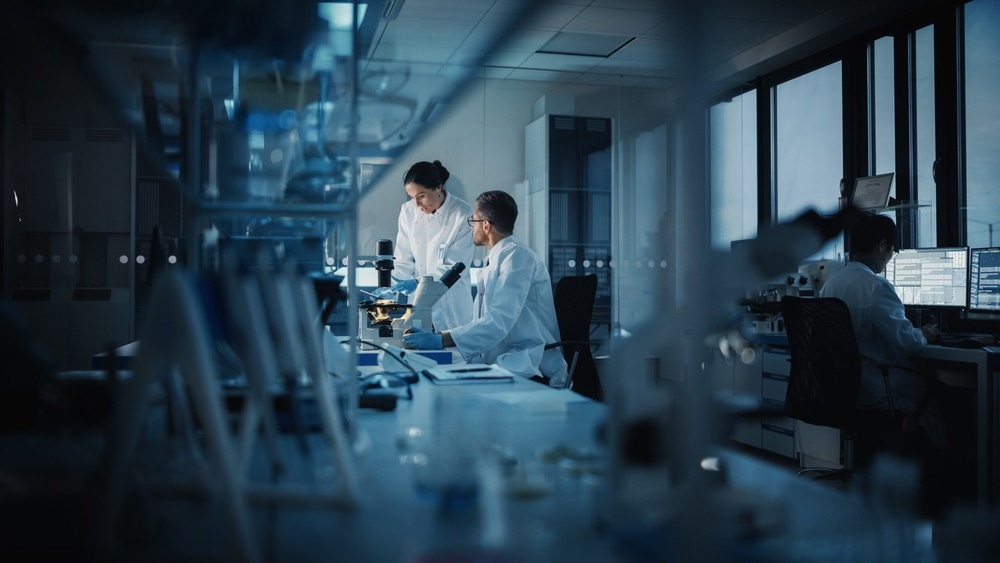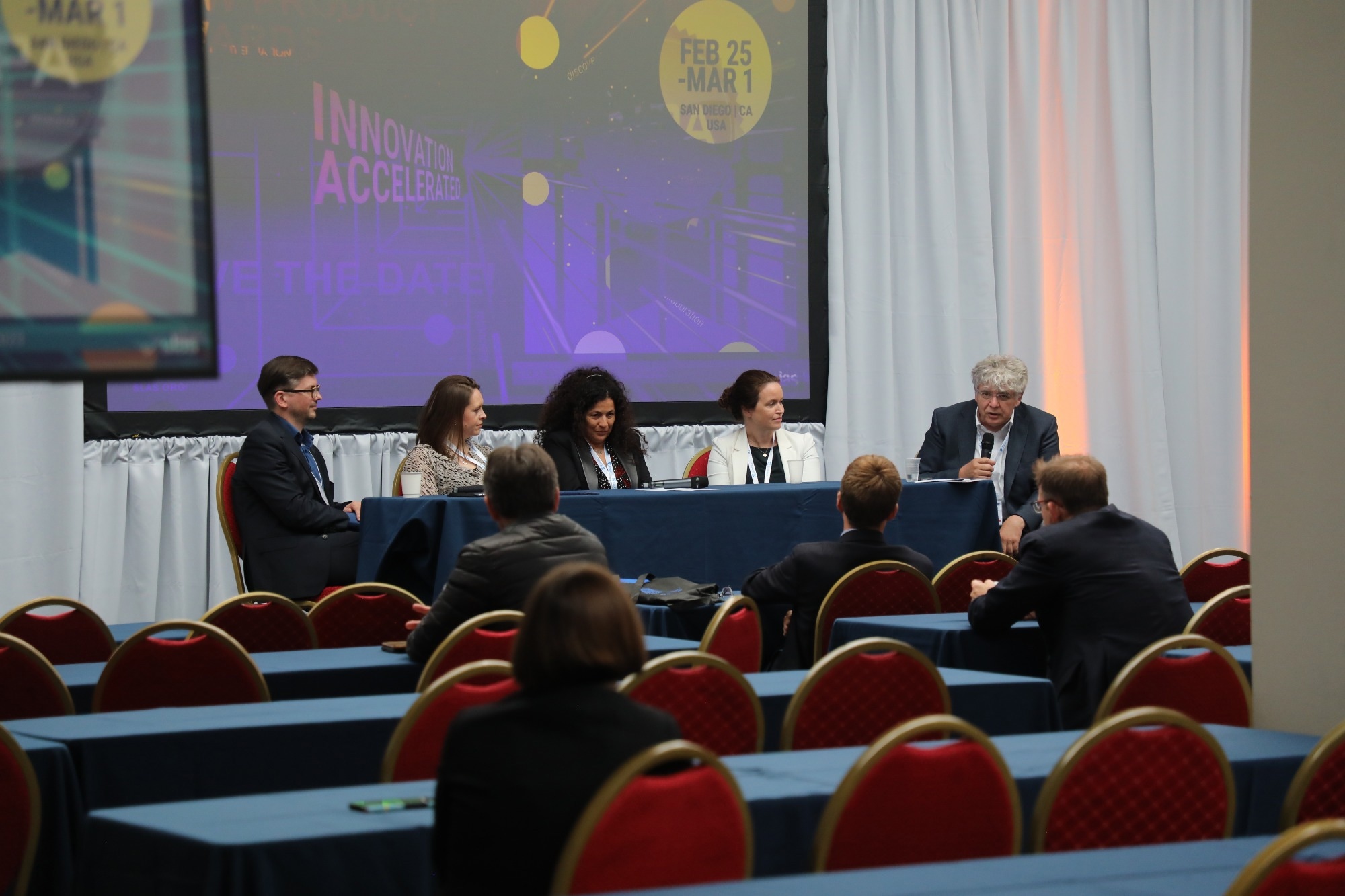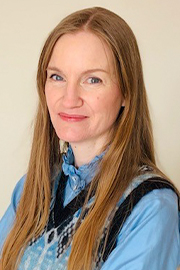In this behind-the-scenes interview, we speak to Dr. Sinéad Knight, chair of SLAS Europe 2023, about this year's program, highlighting the key topics and incredible speakers presenting at the show.
Please can you introduce yourself and tell us what inspired your career within the life sciences?
I'm Sinéad Knight, originally from Tipperary in Ireland, but I have been living in the UK since 2010.
My career in the life sciences started when I moved to Dublin at just 17 to study Biotechnology at Dublin City University. I was always interested in Biology and enjoyed the subject in secondary school.
After I graduated, I got my first job in a QC laboratory at Baxter Healthcare. There I found that I had missed research and soon returned to Dublin to do my Ph.D. at Trinity College Dublin. I have always enjoyed the research aspect of the life sciences, and I find the clinical nature of drug discovery most inspiring.
Currently, you are a principal scientist at Sygnature Discovery, a leading independent provider of integrated drug discovery resources and expertise. Can you tell us more about your role and some of your day-to-day responsibilities?
My role at Sygnature Discovery is very dynamic, and I work with many clients at different drug discovery phases and across various therapeutic areas.
At Sygnature, we are surrounded by experts from both the biotech and pharmaceutical industries and part of my role is to leverage this to help our clients implement effective drug discovery strategies. I will work with computational chemists, bioscientists, biophysicists, medicinal chemists, and in vivo pharmacologists on any given day.
It is a fun and dynamic environment, and there is always something new to learn each day. I enjoy the array of different targets and therapeutic areas.

Image Credit: Gorodenkoff/Shutterstock.com
As someone with over 15 years of experience working in pharmaceutical drug discovery projects, how do you feel the drug discovery sector has evolved over the last ten years? How important is the sector in enabling a better future for human health?
I think Drug Discovery turned a corner after the COVID-19 pandemic, and I think it has given scientists added confidence that drugs can be discovered and delivered to save lives and have a social impact with the right funding and collaborations. Collaborations are so important now for drug discovery; we have seen this more and more; targets get validated quicker, and drugs get discovered more effectively when teams come together.
I also think scientists today have the added challenge of climate change and reducing our carbon footprint in the laboratory. I feel inspired by the younger scientists joining the lab and coming up with new ideas to reduce plastics and waste in the laboratory. Like so many other industries, the life sciences need to change. It's getting harder and harder to ignore the waste generated in life science laboratories.
With so many breakthroughs being made, technology has to continuously evolve to keep up. What role does technology play in the field of drug discovery, and how are new fields such as AI and machine learning impacting this?
Technology is everything. It goes hand in hand with drug discovery, and it allows the life sciences to evolve and open doors that have previously been shut, allowing us to do things faster, smarter and cheaper,
At Sygnature, we have to stay on top of technological advances to stay competitive and attract clients. We work with many startups who want to get answers quickly and efficiently, and technology allows us to do this.
I think AI and machine learning are having a hugely positive impact on the life sciences, especially in mining clinical data to identify footprints of disease and identifying biomarkers. Watch out for the OMICS, Big Data, and AI session in the Frontiers in Technology Track.
As well as your role at Sygnature Discovery, you are also involved in SLAS as one of their program committee members for SLAS EU 2023. Why did you get involved with SLAS, and what does your role entail?
Working with SLAS is a really important part of my career, it enables me to network with colleagues across all the major pharmaceutical industries, such as GSK, AZ, and Roche, as well as academia and biotech. It helps me stay on top of new developments and technologies, which is a huge part of my career.
My role as conference chair is to ensure we bring relevant and cutting-edge to the conference. Attendees come to the conference hoping to learn about new developments in their area and create new collaborations.
A big part of my role is ensuring that we represent a diverse community at SLAS, from biotech, pharmaceutical and academic institutions. I have worked in academia, biotech, CRO, and pharmaceuticals, so it helps build a diverse set of contacts and gives a perspective on the different content the different scientific communities will benefit from.
I am also an associate editor for SLAS Discovery, one of two open-access journals published by SLAS. We've recently added several article types to our journals. It offers another platform to showcase research, protocols, analyses, or other scientific and technical advances.
SLAS Europe 2022 - Dublin, Ireland
SLAS EU 2023 is an international exhibition that brings together life sciences professionals from academia to industry. What makes SLAS special, and how does the collaboration between academia and industry help to accelerate new discoveries in the life sciences?
For me, SLAS is special because it reaches out across such a diverse scientific community internationally, representing biotech, big pharma, and academia. Each community offers something unique in drug discovery, whether it's infrastructure, biological insight, or drug discovery know-how, and SLAS is a perfect platform to bring these together.
Collaborations between academia and industry are hugely beneficial to the life sciences. In academia, we often have experts in a particular therapeutic area, often with close links to University hospitals and clinical samples/data, which can offer invaluable insights into biological processes and therapeutic targets. On the other hand, the industry has decades of drug discovery know-how and can help bring drugs from hit ID through to lead optimization and clinical studies. Both communities can learn and develop faster, making it more fun. Working with different communities makes our job more challenging, interesting, and colorful.
At Europe 2023, we have a rich palette of speakers/chairs from academic institutes such as the University of Oxford, University College Dublin, The Sanger, and the University of Edinburgh.
This year's conference and exhibition will focus on four important educational tracks; Biology Unveiled, Frontiers in Technology, Shaping the Future of Therapeutics, and Bio-Entrepreneurship in Europe'. Can you tell us more about these tracks and the importance of focusing on these areas specifically?
We hope with the broad-reaching tracks that, there will be something for everyone that has an interest in drug discovery,
Frontiers in technology will showcase new developments in technology, but the Biology Unveiled track will demonstrate how these technologies impact and help drive and improve the drug discovery process.
I am really looking forward to the Shaping the Future of Therapeutics, and I think this will be a very popular track. We have seen many developments in this area over the last decade, and the track includes sessions on Cell Therapy, Gene Therapy, Targeted Protein Degradation, and RNA Therapeutics.
Bio-entrepreneurship is an exciting new track, offering valuable insights to those interested in securing investment or developing their research into a startup.
At SLAS EU, there will also be numerous incredible speakers discussing some of the biggest challenges in the life sciences as well as new research and technologies. Can you talk us through some of the speakers people can expect from SLAS this year?
Well, there will be so many great talks; it is not an easy task to highlight a few. The speakers will cover a huge range of topics and will represent academia, biotech, and pharmaceuticals.
The Frontiers in Technology track has speakers lined up to talk through topics on sample management, high content screening and protein science and OMICS, big data, and AI. Louise Weiss from the AI hub will speak about "Machine learning to uncover digital fingerprints in translational omics data". We also have talks on sample management from AstraZeneca, Evotech, and Grenova.
In the biology unveiled track, we have some exciting talks lined up in the Target Validation track from AstraZeneca, The Sanger Institute, and Benevolent AI.
We have expert speakers in future therapeutic areas such as cell therapy, gene therapy, RNA therapeutics, and protein-targeted degradation.
Bio-entrepreneurship is an exciting new track, offering valuable insights from Venture Capitalist Investment to Innovation and IP management.

Image Credit: AZoNetwork
SLAS is also unique as they offer 'Innovation AveNEW', an area on the exhibition floor dedicated to startups. What role do startups have in the life sciences ecosystem, and why is showcasing these new companies invaluable?
Startups are a huge part of the life sciences ecosystem; they bring a dynamic to drug discovery that often bridges the strengths of academia with industry. As well as publishing research, startups translate research into work that has an impact on drug discovery.
Showcasing these new companies at SLAS2023 can help raise the profile of new startups and what they offer across the drug discovery community, foster collaboration, and generate business opportunities.
With over 100 exhibiting companies and numerous international speakers, why should individuals attend SLAS EU 2023? Where can people go to register?
SLAS Europe only comes around once a year. For us here in Europe, it's easier to get to than SLAS in the US, but it offers the same array of dynamic content from international speakers.
It's a fantastic opportunity to network with the life sciences community and get up to speed on new developments and technologies. It's a chance to catch up with vendors, talk through their latest developments, and then head back to your institute packed with ideas for innovation.
You can register online at https://www.slas.org/events-calendar/slas-europe-2023-conference-and-exhibition/attend/register/
What is next for you and your career? Are you involved in any exciting upcoming projects?
As well as chairing SLAS Europe this year, I have also been involved in designing the course content for an SLAS High Content Biology workshop, and I am looking forward to seeing that being rolled out this year.
After serving on the SLAS European Scientific Program Committee (ESPC) for two years, I have recently been elected as vice-chair, and I look forward to the new challenges it brings.
I am also an associate editor for SLAS Discovery, one of two open-access journals published by SLAS. We've recently added several article types to our journals, including protocols, and I look forward to promoting this amongst the life sciences community.
At Sygnature Discovery, I am involved in many different drug discovery projects from early Hit ID, target validation, and lead optimization across a variety of therapeutic areas such as Oncology and Neuroscience, and I am looking forward to working together with our experts in Cell Biology, Biophysics, Med Chemistry, and Computational Chemistry to seeing these projects progress over the next year.
About Dr. Sinéad Knight
Sinead received her PhD in Genetics from Trinity college Dublin, Ireland before moving quickly to the biotech industry.
With almost twenty years of industrial experience in biotech and biopharmaceuticals, Sinéad is an expert in the field of #drug discovery, #target identification and target validation.
Sinéad is currently Principal Scientist and Section Head at Sygnature Discovery working closely with SMEs and biotech companies to develop and progress drug discovery projects.
to develop and progress drug discovery projects.
Previous roles such as Associate Principal Scientist with the Functional Genomics group in #AstraZeneca instilled a love of using cutting-edge technology and informatics to uncover and
translate biology and novel targets across a range of therapeutic areas including cardiovascular, metabolism and oncology.
Sinead’s experience in drug discovery ranges from early hit identification in high-throughput screening through to lead optimisation and candidate selection.
Sinéad has been involved with SLAS since 2019 and is a member of ESPC (SLAS European Scientific Programming Committee) and SLASDiscovery editorial board.